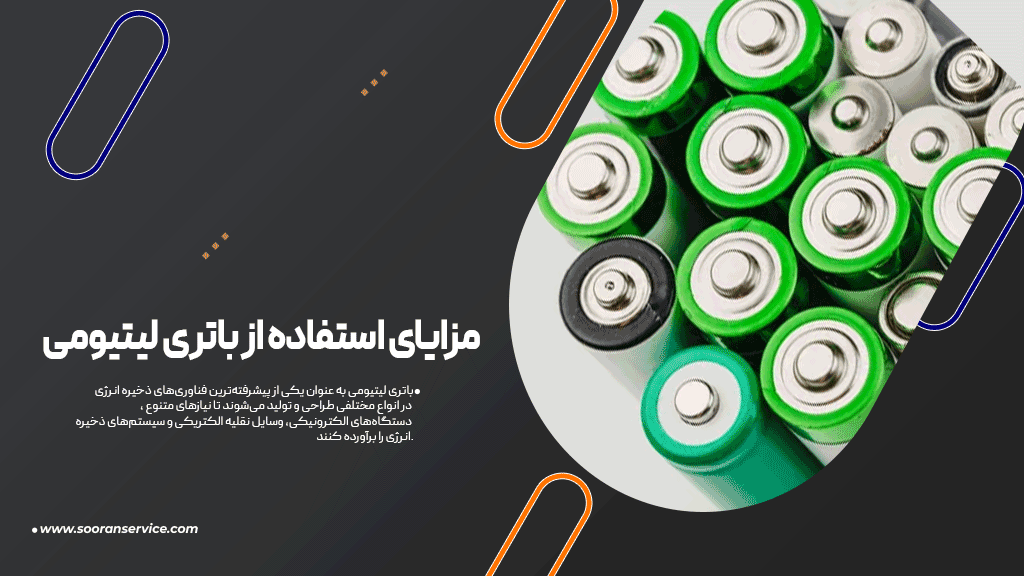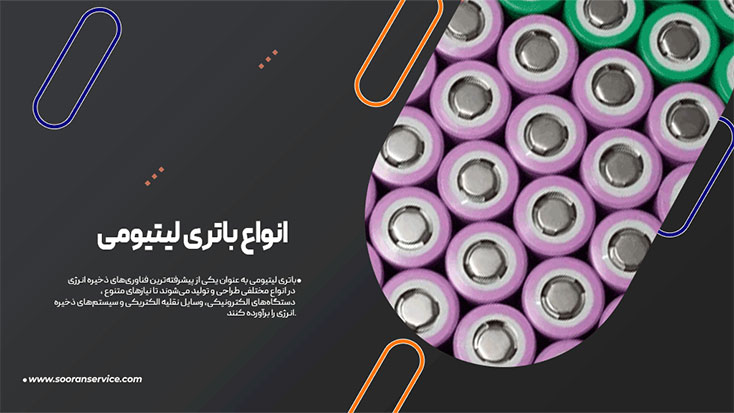Lithium batteries are among the most advanced energy storage technologies available today. They are designed and produced in various forms to meet the diverse energy demands of electronic devices, electric vehicles, and energy storage systems. Depending on their chemical composition and structure, lithium batteries differ in energy density, lifespan, safety, and cost.
Some of the most common types of lithium batteries include Lithium-Ion (Li-ion), Lithium-Polymer (Li-Po), and Lithium Iron Phosphate (LiFePO₄) batteries—each widely used in applications such as smart devices, electric vehicles, and solar energy storage systems. In the following sections, we will introduce these major types of lithium batteries and examine their unique features and advantages.
If you are not yet familiar with what lithium batteries are and how they shape the future of energy, we recommend reading our article:
“What is a Lithium Battery? | How They’re Shaping the Future of Energy.”
Types of Lithium Batteries
Lithium batteries, known for their high efficiency, long lifespan, and wide range of applications, are used in numerous modern devices and systems. They come in different types that vary based on chemical composition, structure, and performance characteristics. Below is an overview of the most common types:
1. Lithium-Ion Battery (Li-ion)
The lithium-ion battery is one of the most widely used types in electronic devices and electric vehicles. Its popularity stems from its high energy density, long cycle life, and lightweight design.
These batteries consist of positive (cathode) and negative (anode) electrodes made with lithium-based materials. During charging, lithium ions move from the cathode to the anode, and during discharging, they flow in the opposite direction to generate electric current.
Li-ion batteries are less prone to overheating compared to older chemistries, but improper use or storage can still cause issues such as thermal runaway, fire, or explosion if mishandled.
2. Lithium-Polymer Battery (Li-Po)
Lithium-polymer batteries are similar to Li-ion batteries but use a solid or gel-based electrolyte instead of a liquid one. This provides greater flexibility in design, allowing them to be made in various shapes and sizes—ideal for slim and lightweight devices such as smartphones, laptops, drones, and smartwatches.
They also have better resistance to temperature fluctuations. However, due to their soft casing and gel structure, physical damage can make them more vulnerable to swelling or combustion.
3. Lithium Iron Phosphate Battery (LiFePO₄)
Lithium iron phosphate batteries use iron phosphate as the cathode material and lithium ions for charge transport. They are known for exceptional safety, long lifespan, and excellent thermal stability.
Although their energy density is lower than that of Li-ion batteries, they are ideal for applications requiring reliability and longevity, such as electric vehicles, solar energy systems, and industrial energy storage.
4. Lithium Cobalt Oxide Battery (LiCoO₂)
These batteries use cobalt oxide as the cathode material. Known for high energy density, compact size, and fast charging, they are commonly used in smartphones, laptops, and digital cameras.
Despite their outstanding performance, LiCoO₂ batteries are costly due to the use of cobalt—a rare and expensive metal—and are sensitive to heat and pressure, requiring careful handling to prevent overheating or explosion.
5. Lithium Titanate Battery (LTO)
Lithium titanate batteries replace the conventional graphite anode with lithium titanate (Li₄Ti₅O₁₂). This chemistry offers extremely fast charging, long cycle life, and excellent temperature tolerance.
They are particularly useful in electric vehicles, backup power systems, and energy storage applications where safety and durability are critical.
6. Lithium-Sulfur Battery (Li-S)
Lithium-sulfur batteries are a next-generation technology that use sulfur as the cathode and lithium as the anode. They promise up to five times higher energy capacity compared to conventional lithium-ion batteries and are significantly cheaper to produce due to the abundance of sulfur.
These batteries are expected to play a major role in electric vehicles and large-scale energy storage in the near future.
7. Solid-State Lithium Battery
Solid-state lithium batteries use a solid electrolyte instead of a liquid or gel. This makes them safer, more stable at high temperatures, and less prone to leaks or combustion.
Their compact and lightweight design also makes them ideal for electric vehicles, wearable electronics, and energy storage systems. As research advances, solid-state batteries are poised to revolutionize the future of energy storage.

Advantages of Using Lithium Batteries
Using various types of lithium batteries offers numerous advantages, making them a preferred choice in many devices and systems. Some of the key benefits include:
High Energy Density:
Lithium batteries store significantly more energy compared to other types of batteries of similar size and weight. This allows devices to operate longer on a single charge while remaining lightweight.
Long Lifespan:
Lithium batteries generally have a much longer lifespan than conventional batteries, reducing replacement costs over time.
Fast Charging:
These batteries typically support fast charging, which is highly convenient for users—especially in situations where charging time is limited.
Low Maintenance:
Unlike older battery types that required full discharge or specific maintenance cycles, lithium batteries can be charged at any time without risk of damage or reduced performance.
Conclusion
As mentioned, lithium batteries represent one of the most significant technological advancements in modern energy storage. Their various types, each with distinct characteristics and applications, have improved both industrial and everyday life.
Ongoing innovations—such as the development of solid-state and lithium-sulfur batteries—promise a future of safer, more efficient, and environmentally sustainable energy solutions.
Choosing the right type of lithium battery for your specific needs not only enhances performance and reliability but also helps reduce operational costs and improve energy sustainability.
For more information and expert guidance, please contact us — our specialists are ready to assist you.




No comments yet.